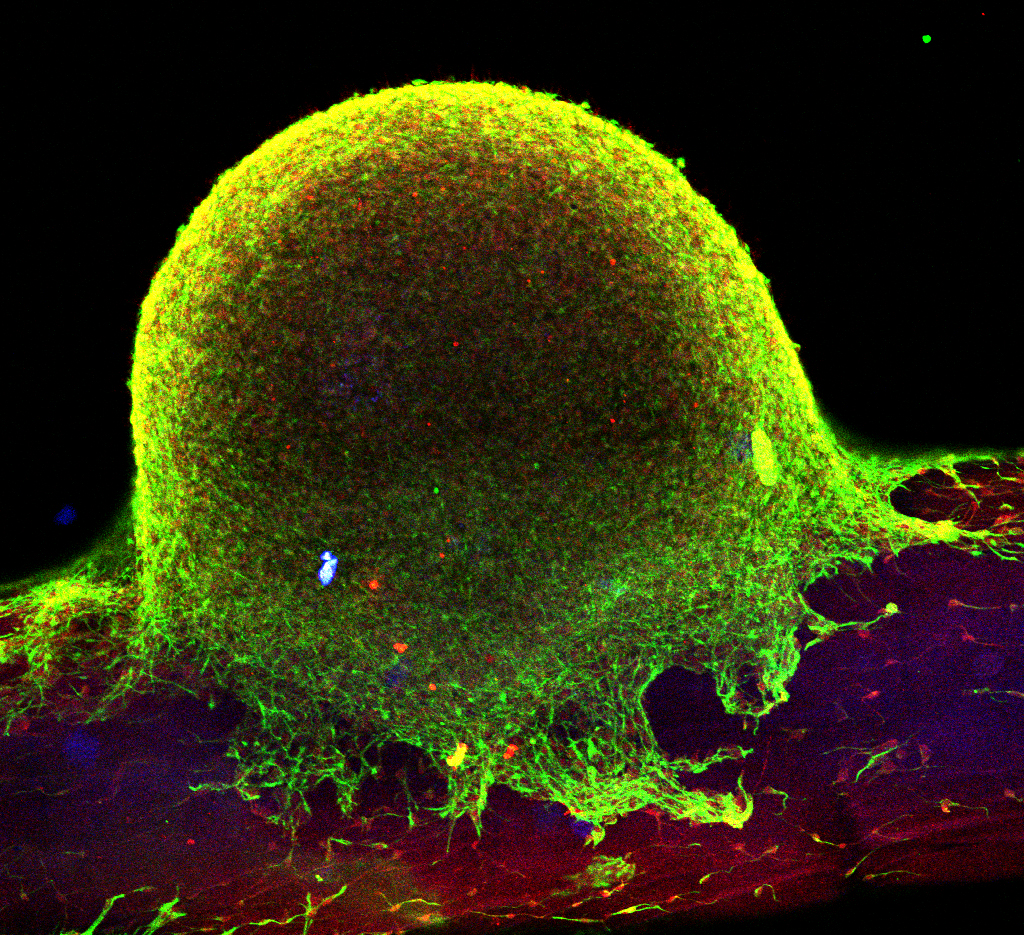-

Stopping Diabetes in its Tracks
For the last decade, Ronald Ackermann, MD, MPH, has worked on implementing a method to halt diabetes that is both effective for patients and affordable for insurers. He and colleagues have focused on adapting an intervention called the Diabetes Prevention Program.
-

On the Forefront of Regenerative Medicine
Northwestern’s biomaterials labs are developing the next generation of materials in medicine, called supramolecular biomaterials – molecules designed in a way to mimic cell structures and functions of biological signaling.
-

Identifying Blood Cell Contribution to Inflammation After Seizures
Northwestern Medicine scientists co-authored a study that identified a blood cell not normally found in the healthy brain that can invade brain tissue after status epilepticus, a type of seizure, and contributes to inflammation.
-

Driskill Graduate Program Honors Students and Faculty
At Driskill day, students, faculty members and alumni celebrated accomplishments and research occurring in the Driskill Graduate Program in Life Sciences.
-

One Year of Progress on the Simpson Querrey Biomedical Research Center
The senior project manager for the the Louis A. Simpson and Kimberly K. Querrey Biomedical Research Center shares the current progress on the construction of the university’s largest single construction project to date.
-

Inspired by Nature
This year, the University launched a new Center for Synthetic Biology, making Northwestern one of the top three U.S. destinations for research and education in this area.
-

Untangling the Financial Dynamics of Pharmaceutical Innovation
Victor Roy, an MD/PhD candidate, described the tension between pharmaceutical innovation and affordability in a recently published analysis.
-

Accelerating Precision Medicine for African American Patients
Northwestern Medicine scientists have received a $7.5 million grant to study how genetic information from African American patients can predict their responses to medications.
-

NIH Director Visits Northwestern to Discuss Importance Of Research Funding
National Institutes of Health Director Francis Collins and Illinois Sen. Dick Durbin spoke to an auditorium of nearly 300 physicians and researchers at Northwestern about the critical importance of sustaining momentum in medical research funding.
-

Cardiac Stem Cells Predict Drug Safety and Efficacy
Analyzing a patient’s own stem cells can predict the safety and efficacy of drugs that have the potential to damage a patient’s heart, according to a new study.
-

Northwestern’s Cognitive Neurology and Alzheimer’s Disease Center Receives $8.6 Million Renewal
The National Institute on Aging has renewed funding for the Cognitive Neurology and Alzheimer’s Disease Center, supporting an additional five years of research, and marking 25 years of continuous grant support.
-

Using Human-Centered Design to Create Better Healthcare Models in Kenya
Fourth-year medical student Claudia Leung spent the past year in western Kenya doing research and developing a healthcare model for patients with chronic diseases.
-

Echocardiography Simulation Assesses Competency for Trainees
Jyothy Puthumana, MD, uses a specialized echocardiography simulator to better assess trainees’ and experienced cardiologists’ competency on trans esophageal echocardiogram, with the goal of improving patient care.
-

Green Elected to German National Academy of Sciences
Kathleen Green, PhD, Joseph L. Mayberry, Sr., Professor of Pathology and Toxicology and professor of Dermatology, has been elected to the German National Academy of Sciences for her scientific achievements.
-

Bringing LGBT Health to the Forefront
Northwestern hosted the inaugural State of LGBT Health Symposium, bringing together scientists, policymakers and community members to discuss how federal resources are being mobilized to improve the health of lesbian, gay, bisexual, transgender, queer and gender-nonconforming people.
-

Guidelines Published for Managing Chronic Pain in Cancer Survivors
An expert panel led by Northwestern Medicine investigator Judith Paice, PhD, RN, developed recommendations to help clinicians manage the chronic pain of cancer survivors.
-

Aarati Didwania Named Director of Honors Program in Medical Education
Aarati Didwania, MD, ’04 MSCI, associate professor of Medicine, has been named director of the Honors Program in Medical Education at Northwestern University Feinberg School of Medicine.
-

2010 Cholera Epidemic Linked to Hypervirulent Strain
Northwestern Medicine scientists have discovered that the cholera strain responsible for the 2010 epidemic in Haiti is a hypervirulent variant.
-

Feinberg Welcomes New PhD Students to Campus
First-year graduate students arrive on campus to pursue degrees from the Driskill Graduate Program in the Life Sciences, Northwestern University Interdepartmental Neuroscience Program, Medical Scientist Training Program and more.
-

Incoming Medical Students Shadow Healthcare Professionals
First-year medical students at Feinberg spent part of their first week shadowing healthcare professionals during their Introduction to the Profession Module.
Recent News
-

Inspired by Nature
This year, the University launched a new Center for Synthetic Biology, making Northwestern one of the top three U.S. destinations for research and education in this area.






